Entrepreneurship and Small Business: Management and Impact Analysis
VerifiedAdded on 2020/06/04
|11
|3848
|54
Report
AI Summary
This report provides an overview of entrepreneurship and small business management, focusing on the different types of entrepreneurial ventures, their similarities and differences, and the impact of micro and small businesses on the economy. It assesses the value of contributions by small and medium enterprises (SMEs) to society and the economy, highlighting traits and skills of successful entrepreneurs, aspects of entrepreneurial personality, and potential hindrances. The report uses Talent Plus, a UK-based consultancy, as an example, examining its role in guiding new entrepreneurs and contributing to economic growth by providing employment opportunities and fostering innovative ideas. It further discusses the classification of enterprises into micro, small, and medium businesses and their respective roles in enhancing revenues and providing job opportunities.

Entrepreneurship and Small
Business Management
Business Management
Paraphrase This Document
Need a fresh take? Get an instant paraphrase of this document with our AI Paraphraser
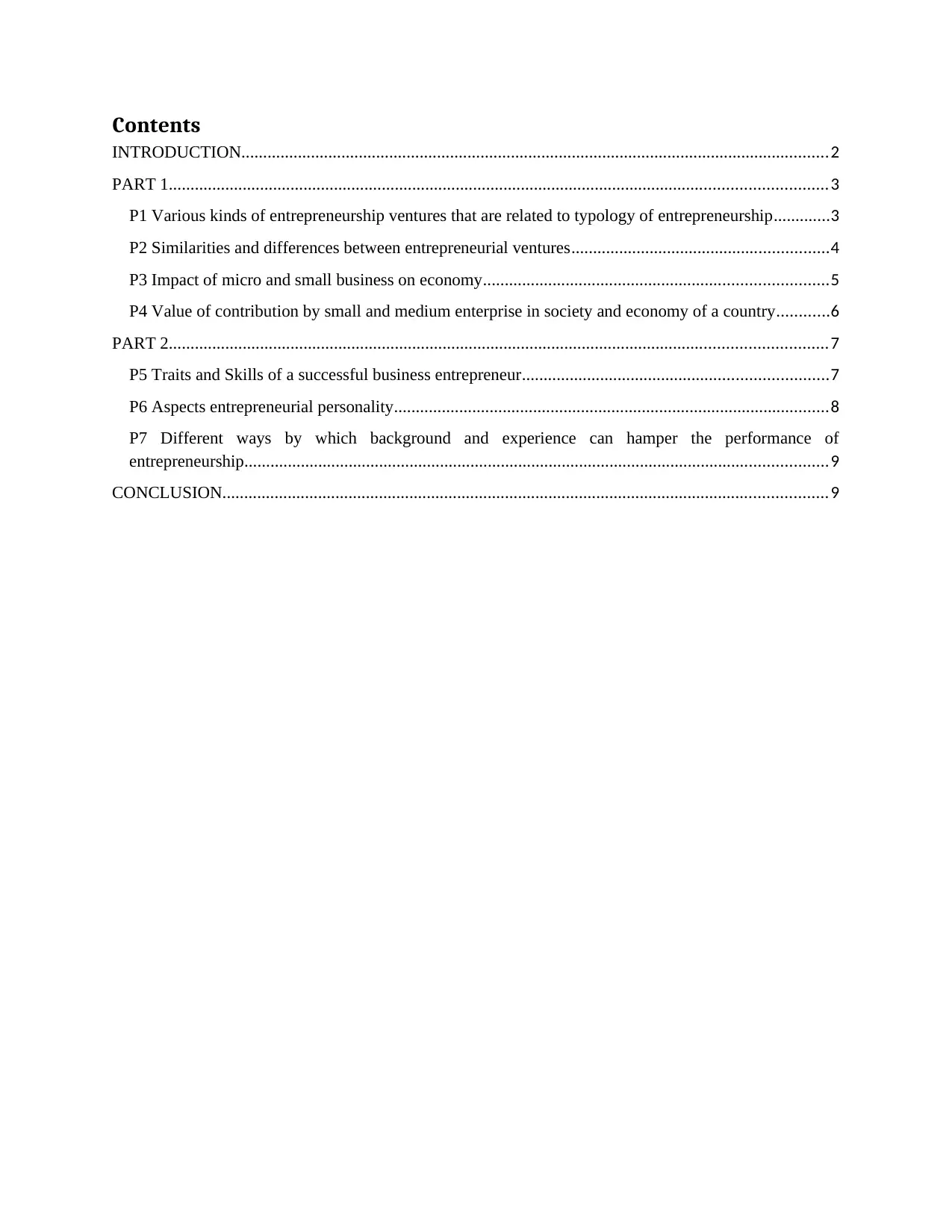
Contents
INTRODUCTION.......................................................................................................................................2
PART 1.......................................................................................................................................................3
P1 Various kinds of entrepreneurship ventures that are related to typology of entrepreneurship.............3
P2 Similarities and differences between entrepreneurial ventures...........................................................4
P3 Impact of micro and small business on economy...............................................................................5
P4 Value of contribution by small and medium enterprise in society and economy of a country............6
PART 2.......................................................................................................................................................7
P5 Traits and Skills of a successful business entrepreneur......................................................................7
P6 Aspects entrepreneurial personality....................................................................................................8
P7 Different ways by which background and experience can hamper the performance of
entrepreneurship......................................................................................................................................9
CONCLUSION...........................................................................................................................................9
INTRODUCTION.......................................................................................................................................2
PART 1.......................................................................................................................................................3
P1 Various kinds of entrepreneurship ventures that are related to typology of entrepreneurship.............3
P2 Similarities and differences between entrepreneurial ventures...........................................................4
P3 Impact of micro and small business on economy...............................................................................5
P4 Value of contribution by small and medium enterprise in society and economy of a country............6
PART 2.......................................................................................................................................................7
P5 Traits and Skills of a successful business entrepreneur......................................................................7
P6 Aspects entrepreneurial personality....................................................................................................8
P7 Different ways by which background and experience can hamper the performance of
entrepreneurship......................................................................................................................................9
CONCLUSION...........................................................................................................................................9
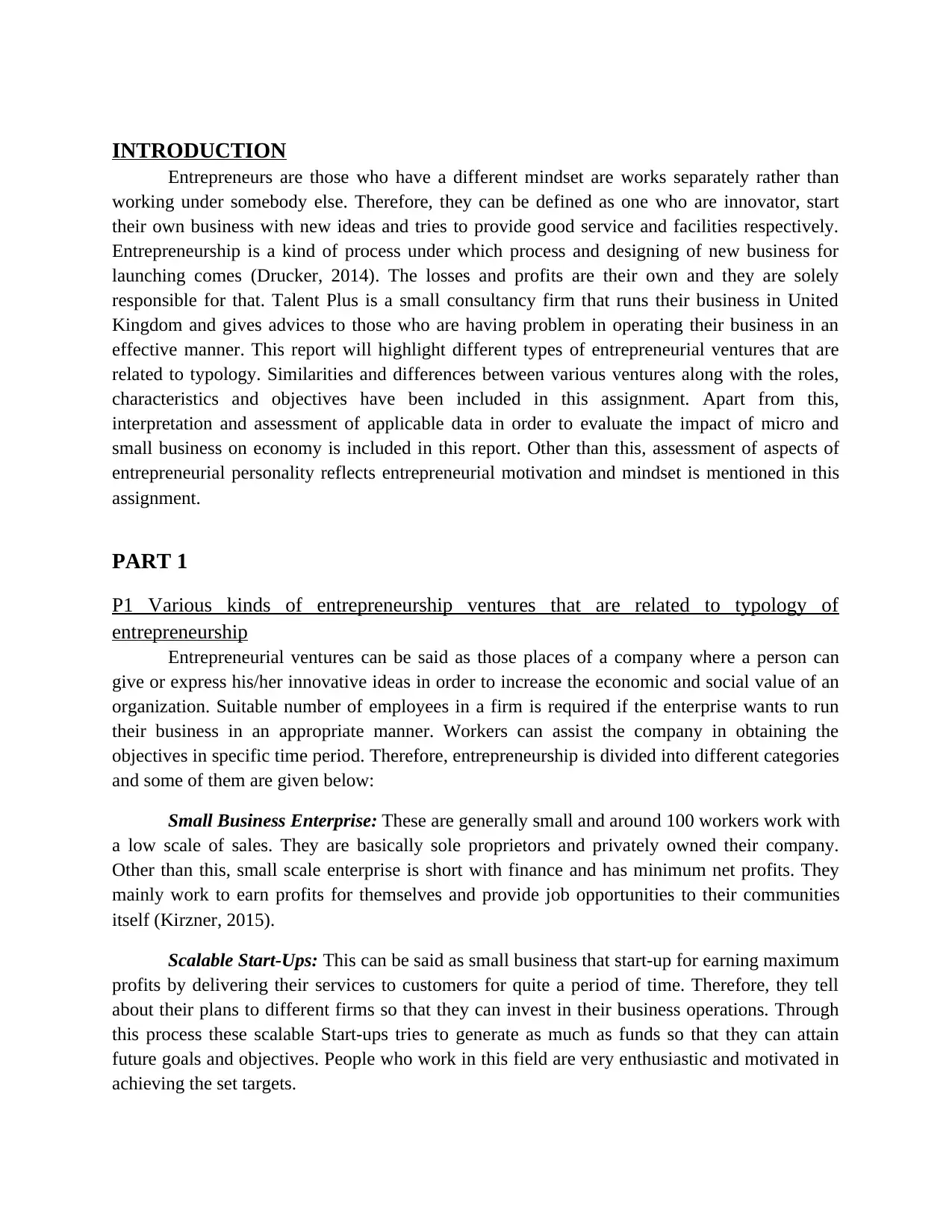
INTRODUCTION
Entrepreneurs are those who have a different mindset are works separately rather than
working under somebody else. Therefore, they can be defined as one who are innovator, start
their own business with new ideas and tries to provide good service and facilities respectively.
Entrepreneurship is a kind of process under which process and designing of new business for
launching comes (Drucker, 2014). The losses and profits are their own and they are solely
responsible for that. Talent Plus is a small consultancy firm that runs their business in United
Kingdom and gives advices to those who are having problem in operating their business in an
effective manner. This report will highlight different types of entrepreneurial ventures that are
related to typology. Similarities and differences between various ventures along with the roles,
characteristics and objectives have been included in this assignment. Apart from this,
interpretation and assessment of applicable data in order to evaluate the impact of micro and
small business on economy is included in this report. Other than this, assessment of aspects of
entrepreneurial personality reflects entrepreneurial motivation and mindset is mentioned in this
assignment.
PART 1
P1 Various kinds of entrepreneurship ventures that are related to typology of
entrepreneurship
Entrepreneurial ventures can be said as those places of a company where a person can
give or express his/her innovative ideas in order to increase the economic and social value of an
organization. Suitable number of employees in a firm is required if the enterprise wants to run
their business in an appropriate manner. Workers can assist the company in obtaining the
objectives in specific time period. Therefore, entrepreneurship is divided into different categories
and some of them are given below:
Small Business Enterprise: These are generally small and around 100 workers work with
a low scale of sales. They are basically sole proprietors and privately owned their company.
Other than this, small scale enterprise is short with finance and has minimum net profits. They
mainly work to earn profits for themselves and provide job opportunities to their communities
itself (Kirzner, 2015).
Scalable Start-Ups: This can be said as small business that start-up for earning maximum
profits by delivering their services to customers for quite a period of time. Therefore, they tell
about their plans to different firms so that they can invest in their business operations. Through
this process these scalable Start-ups tries to generate as much as funds so that they can attain
future goals and objectives. People who work in this field are very enthusiastic and motivated in
achieving the set targets.
Entrepreneurs are those who have a different mindset are works separately rather than
working under somebody else. Therefore, they can be defined as one who are innovator, start
their own business with new ideas and tries to provide good service and facilities respectively.
Entrepreneurship is a kind of process under which process and designing of new business for
launching comes (Drucker, 2014). The losses and profits are their own and they are solely
responsible for that. Talent Plus is a small consultancy firm that runs their business in United
Kingdom and gives advices to those who are having problem in operating their business in an
effective manner. This report will highlight different types of entrepreneurial ventures that are
related to typology. Similarities and differences between various ventures along with the roles,
characteristics and objectives have been included in this assignment. Apart from this,
interpretation and assessment of applicable data in order to evaluate the impact of micro and
small business on economy is included in this report. Other than this, assessment of aspects of
entrepreneurial personality reflects entrepreneurial motivation and mindset is mentioned in this
assignment.
PART 1
P1 Various kinds of entrepreneurship ventures that are related to typology of
entrepreneurship
Entrepreneurial ventures can be said as those places of a company where a person can
give or express his/her innovative ideas in order to increase the economic and social value of an
organization. Suitable number of employees in a firm is required if the enterprise wants to run
their business in an appropriate manner. Workers can assist the company in obtaining the
objectives in specific time period. Therefore, entrepreneurship is divided into different categories
and some of them are given below:
Small Business Enterprise: These are generally small and around 100 workers work with
a low scale of sales. They are basically sole proprietors and privately owned their company.
Other than this, small scale enterprise is short with finance and has minimum net profits. They
mainly work to earn profits for themselves and provide job opportunities to their communities
itself (Kirzner, 2015).
Scalable Start-Ups: This can be said as small business that start-up for earning maximum
profits by delivering their services to customers for quite a period of time. Therefore, they tell
about their plans to different firms so that they can invest in their business operations. Through
this process these scalable Start-ups tries to generate as much as funds so that they can attain
future goals and objectives. People who work in this field are very enthusiastic and motivated in
achieving the set targets.
⊘ This is a preview!⊘
Do you want full access?
Subscribe today to unlock all pages.

Trusted by 1+ million students worldwide
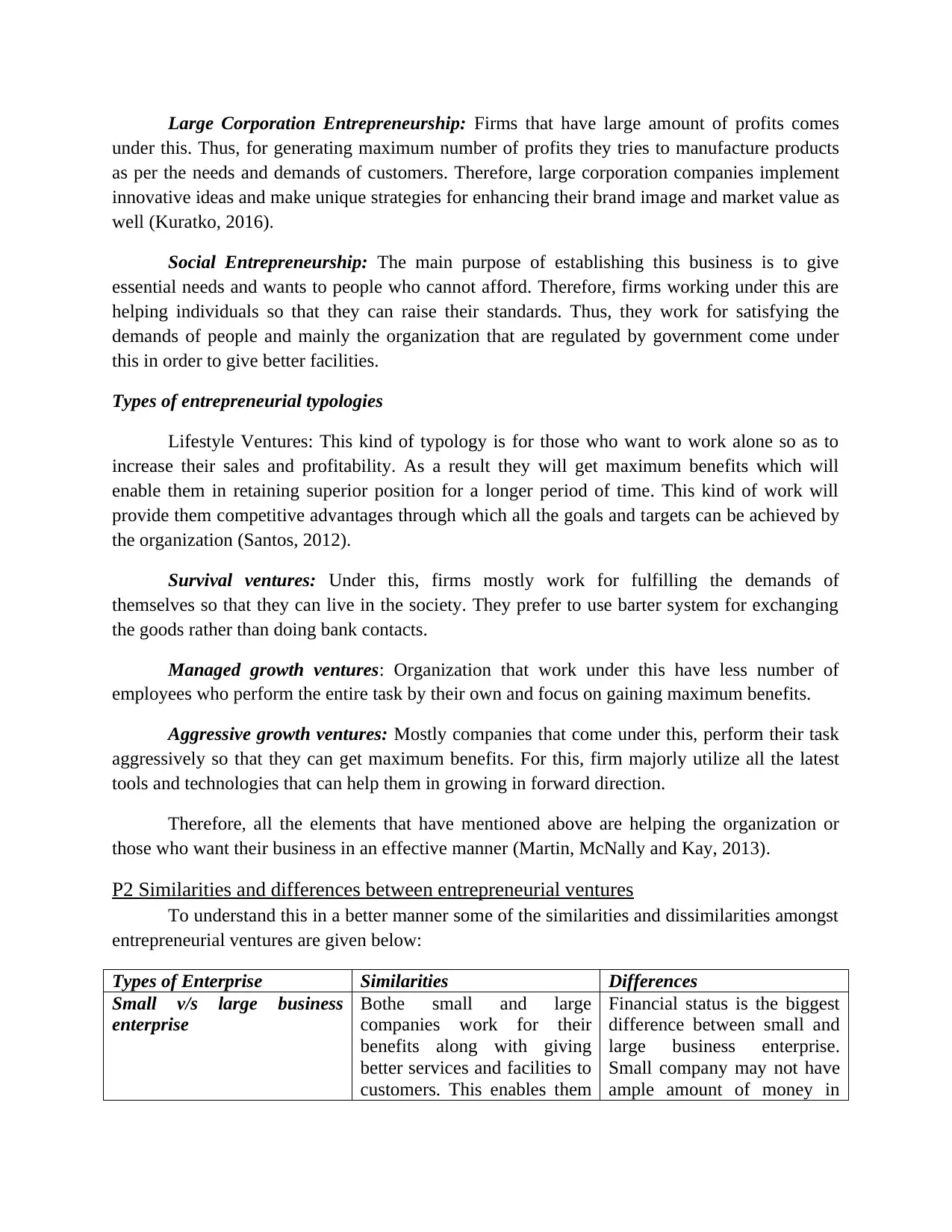
Large Corporation Entrepreneurship: Firms that have large amount of profits comes
under this. Thus, for generating maximum number of profits they tries to manufacture products
as per the needs and demands of customers. Therefore, large corporation companies implement
innovative ideas and make unique strategies for enhancing their brand image and market value as
well (Kuratko, 2016).
Social Entrepreneurship: The main purpose of establishing this business is to give
essential needs and wants to people who cannot afford. Therefore, firms working under this are
helping individuals so that they can raise their standards. Thus, they work for satisfying the
demands of people and mainly the organization that are regulated by government come under
this in order to give better facilities.
Types of entrepreneurial typologies
Lifestyle Ventures: This kind of typology is for those who want to work alone so as to
increase their sales and profitability. As a result they will get maximum benefits which will
enable them in retaining superior position for a longer period of time. This kind of work will
provide them competitive advantages through which all the goals and targets can be achieved by
the organization (Santos, 2012).
Survival ventures: Under this, firms mostly work for fulfilling the demands of
themselves so that they can live in the society. They prefer to use barter system for exchanging
the goods rather than doing bank contacts.
Managed growth ventures: Organization that work under this have less number of
employees who perform the entire task by their own and focus on gaining maximum benefits.
Aggressive growth ventures: Mostly companies that come under this, perform their task
aggressively so that they can get maximum benefits. For this, firm majorly utilize all the latest
tools and technologies that can help them in growing in forward direction.
Therefore, all the elements that have mentioned above are helping the organization or
those who want their business in an effective manner (Martin, McNally and Kay, 2013).
P2 Similarities and differences between entrepreneurial ventures
To understand this in a better manner some of the similarities and dissimilarities amongst
entrepreneurial ventures are given below:
Types of Enterprise Similarities Differences
Small v/s large business
enterprise
Bothe small and large
companies work for their
benefits along with giving
better services and facilities to
customers. This enables them
Financial status is the biggest
difference between small and
large business enterprise.
Small company may not have
ample amount of money in
under this. Thus, for generating maximum number of profits they tries to manufacture products
as per the needs and demands of customers. Therefore, large corporation companies implement
innovative ideas and make unique strategies for enhancing their brand image and market value as
well (Kuratko, 2016).
Social Entrepreneurship: The main purpose of establishing this business is to give
essential needs and wants to people who cannot afford. Therefore, firms working under this are
helping individuals so that they can raise their standards. Thus, they work for satisfying the
demands of people and mainly the organization that are regulated by government come under
this in order to give better facilities.
Types of entrepreneurial typologies
Lifestyle Ventures: This kind of typology is for those who want to work alone so as to
increase their sales and profitability. As a result they will get maximum benefits which will
enable them in retaining superior position for a longer period of time. This kind of work will
provide them competitive advantages through which all the goals and targets can be achieved by
the organization (Santos, 2012).
Survival ventures: Under this, firms mostly work for fulfilling the demands of
themselves so that they can live in the society. They prefer to use barter system for exchanging
the goods rather than doing bank contacts.
Managed growth ventures: Organization that work under this have less number of
employees who perform the entire task by their own and focus on gaining maximum benefits.
Aggressive growth ventures: Mostly companies that come under this, perform their task
aggressively so that they can get maximum benefits. For this, firm majorly utilize all the latest
tools and technologies that can help them in growing in forward direction.
Therefore, all the elements that have mentioned above are helping the organization or
those who want their business in an effective manner (Martin, McNally and Kay, 2013).
P2 Similarities and differences between entrepreneurial ventures
To understand this in a better manner some of the similarities and dissimilarities amongst
entrepreneurial ventures are given below:
Types of Enterprise Similarities Differences
Small v/s large business
enterprise
Bothe small and large
companies work for their
benefits along with giving
better services and facilities to
customers. This enables them
Financial status is the biggest
difference between small and
large business enterprise.
Small company may not have
ample amount of money in
Paraphrase This Document
Need a fresh take? Get an instant paraphrase of this document with our AI Paraphraser
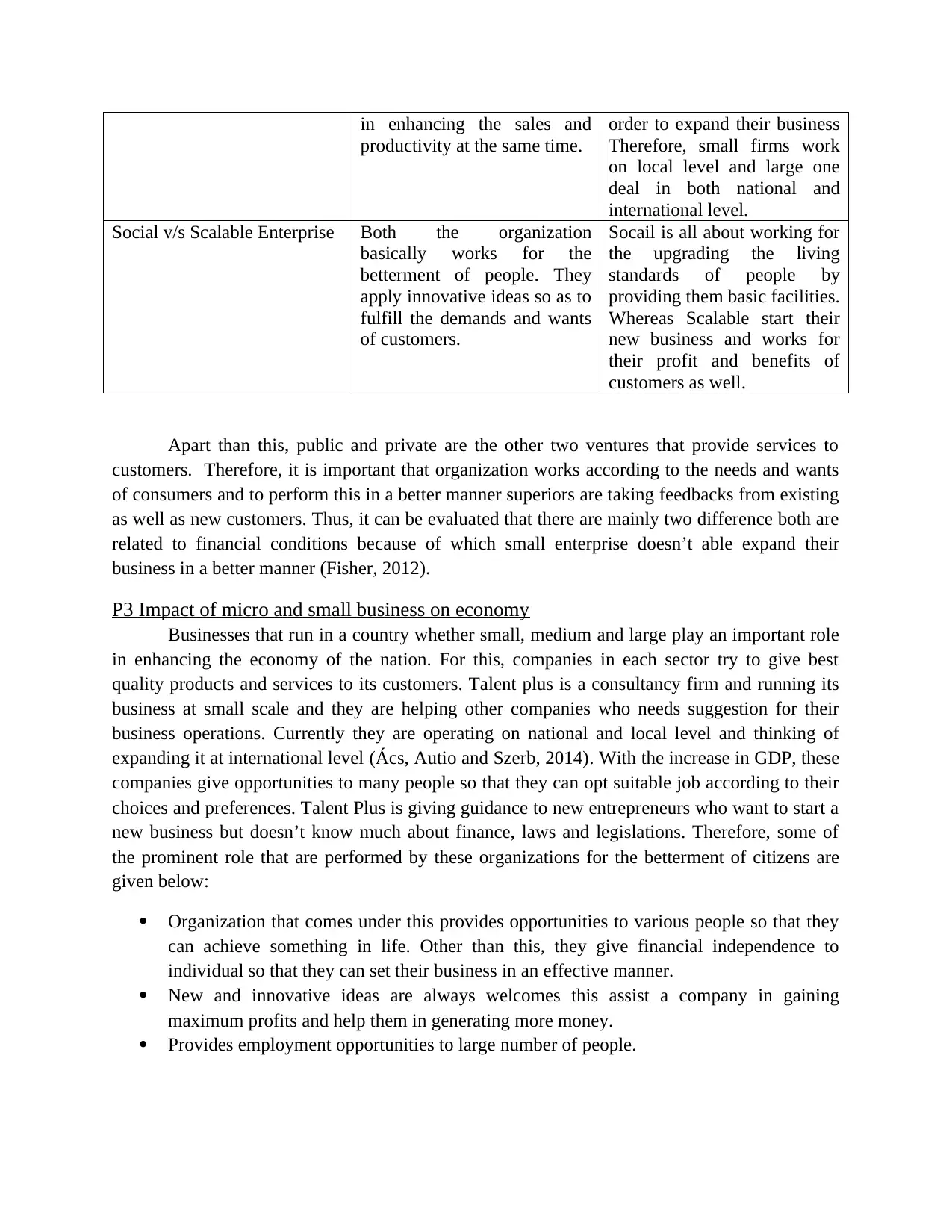
in enhancing the sales and
productivity at the same time.
order to expand their business
Therefore, small firms work
on local level and large one
deal in both national and
international level.
Social v/s Scalable Enterprise Both the organization
basically works for the
betterment of people. They
apply innovative ideas so as to
fulfill the demands and wants
of customers.
Socail is all about working for
the upgrading the living
standards of people by
providing them basic facilities.
Whereas Scalable start their
new business and works for
their profit and benefits of
customers as well.
Apart than this, public and private are the other two ventures that provide services to
customers. Therefore, it is important that organization works according to the needs and wants
of consumers and to perform this in a better manner superiors are taking feedbacks from existing
as well as new customers. Thus, it can be evaluated that there are mainly two difference both are
related to financial conditions because of which small enterprise doesn’t able expand their
business in a better manner (Fisher, 2012).
P3 Impact of micro and small business on economy
Businesses that run in a country whether small, medium and large play an important role
in enhancing the economy of the nation. For this, companies in each sector try to give best
quality products and services to its customers. Talent plus is a consultancy firm and running its
business at small scale and they are helping other companies who needs suggestion for their
business operations. Currently they are operating on national and local level and thinking of
expanding it at international level (Ács, Autio and Szerb, 2014). With the increase in GDP, these
companies give opportunities to many people so that they can opt suitable job according to their
choices and preferences. Talent Plus is giving guidance to new entrepreneurs who want to start a
new business but doesn’t know much about finance, laws and legislations. Therefore, some of
the prominent role that are performed by these organizations for the betterment of citizens are
given below:
Organization that comes under this provides opportunities to various people so that they
can achieve something in life. Other than this, they give financial independence to
individual so that they can set their business in an effective manner.
New and innovative ideas are always welcomes this assist a company in gaining
maximum profits and help them in generating more money.
Provides employment opportunities to large number of people.
productivity at the same time.
order to expand their business
Therefore, small firms work
on local level and large one
deal in both national and
international level.
Social v/s Scalable Enterprise Both the organization
basically works for the
betterment of people. They
apply innovative ideas so as to
fulfill the demands and wants
of customers.
Socail is all about working for
the upgrading the living
standards of people by
providing them basic facilities.
Whereas Scalable start their
new business and works for
their profit and benefits of
customers as well.
Apart than this, public and private are the other two ventures that provide services to
customers. Therefore, it is important that organization works according to the needs and wants
of consumers and to perform this in a better manner superiors are taking feedbacks from existing
as well as new customers. Thus, it can be evaluated that there are mainly two difference both are
related to financial conditions because of which small enterprise doesn’t able expand their
business in a better manner (Fisher, 2012).
P3 Impact of micro and small business on economy
Businesses that run in a country whether small, medium and large play an important role
in enhancing the economy of the nation. For this, companies in each sector try to give best
quality products and services to its customers. Talent plus is a consultancy firm and running its
business at small scale and they are helping other companies who needs suggestion for their
business operations. Currently they are operating on national and local level and thinking of
expanding it at international level (Ács, Autio and Szerb, 2014). With the increase in GDP, these
companies give opportunities to many people so that they can opt suitable job according to their
choices and preferences. Talent Plus is giving guidance to new entrepreneurs who want to start a
new business but doesn’t know much about finance, laws and legislations. Therefore, some of
the prominent role that are performed by these organizations for the betterment of citizens are
given below:
Organization that comes under this provides opportunities to various people so that they
can achieve something in life. Other than this, they give financial independence to
individual so that they can set their business in an effective manner.
New and innovative ideas are always welcomes this assist a company in gaining
maximum profits and help them in generating more money.
Provides employment opportunities to large number of people.
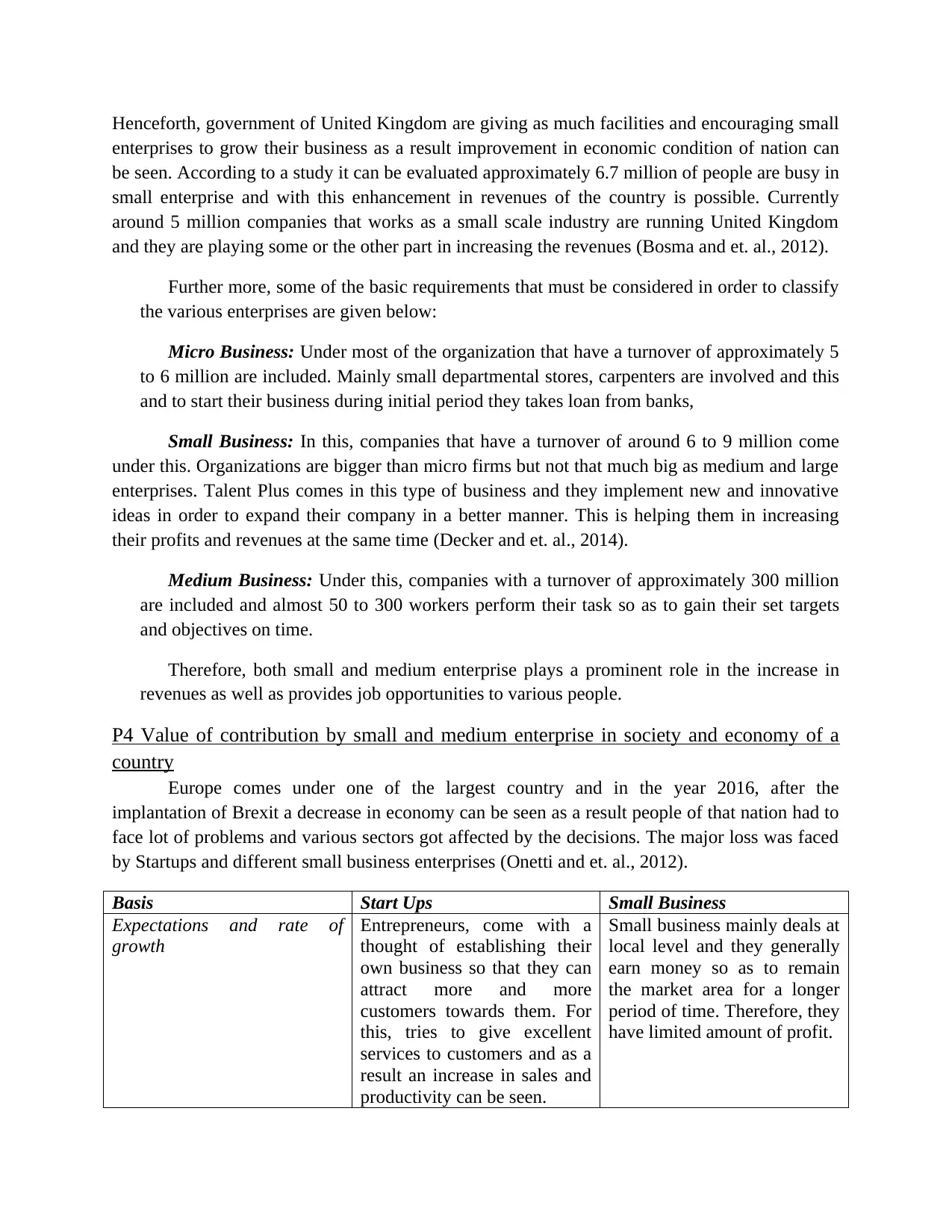
Henceforth, government of United Kingdom are giving as much facilities and encouraging small
enterprises to grow their business as a result improvement in economic condition of nation can
be seen. According to a study it can be evaluated approximately 6.7 million of people are busy in
small enterprise and with this enhancement in revenues of the country is possible. Currently
around 5 million companies that works as a small scale industry are running United Kingdom
and they are playing some or the other part in increasing the revenues (Bosma and et. al., 2012).
Further more, some of the basic requirements that must be considered in order to classify
the various enterprises are given below:
Micro Business: Under most of the organization that have a turnover of approximately 5
to 6 million are included. Mainly small departmental stores, carpenters are involved and this
and to start their business during initial period they takes loan from banks,
Small Business: In this, companies that have a turnover of around 6 to 9 million come
under this. Organizations are bigger than micro firms but not that much big as medium and large
enterprises. Talent Plus comes in this type of business and they implement new and innovative
ideas in order to expand their company in a better manner. This is helping them in increasing
their profits and revenues at the same time (Decker and et. al., 2014).
Medium Business: Under this, companies with a turnover of approximately 300 million
are included and almost 50 to 300 workers perform their task so as to gain their set targets
and objectives on time.
Therefore, both small and medium enterprise plays a prominent role in the increase in
revenues as well as provides job opportunities to various people.
P4 Value of contribution by small and medium enterprise in society and economy of a
country
Europe comes under one of the largest country and in the year 2016, after the
implantation of Brexit a decrease in economy can be seen as a result people of that nation had to
face lot of problems and various sectors got affected by the decisions. The major loss was faced
by Startups and different small business enterprises (Onetti and et. al., 2012).
Basis Start Ups Small Business
Expectations and rate of
growth
Entrepreneurs, come with a
thought of establishing their
own business so that they can
attract more and more
customers towards them. For
this, tries to give excellent
services to customers and as a
result an increase in sales and
productivity can be seen.
Small business mainly deals at
local level and they generally
earn money so as to remain
the market area for a longer
period of time. Therefore, they
have limited amount of profit.
enterprises to grow their business as a result improvement in economic condition of nation can
be seen. According to a study it can be evaluated approximately 6.7 million of people are busy in
small enterprise and with this enhancement in revenues of the country is possible. Currently
around 5 million companies that works as a small scale industry are running United Kingdom
and they are playing some or the other part in increasing the revenues (Bosma and et. al., 2012).
Further more, some of the basic requirements that must be considered in order to classify
the various enterprises are given below:
Micro Business: Under most of the organization that have a turnover of approximately 5
to 6 million are included. Mainly small departmental stores, carpenters are involved and this
and to start their business during initial period they takes loan from banks,
Small Business: In this, companies that have a turnover of around 6 to 9 million come
under this. Organizations are bigger than micro firms but not that much big as medium and large
enterprises. Talent Plus comes in this type of business and they implement new and innovative
ideas in order to expand their company in a better manner. This is helping them in increasing
their profits and revenues at the same time (Decker and et. al., 2014).
Medium Business: Under this, companies with a turnover of approximately 300 million
are included and almost 50 to 300 workers perform their task so as to gain their set targets
and objectives on time.
Therefore, both small and medium enterprise plays a prominent role in the increase in
revenues as well as provides job opportunities to various people.
P4 Value of contribution by small and medium enterprise in society and economy of a
country
Europe comes under one of the largest country and in the year 2016, after the
implantation of Brexit a decrease in economy can be seen as a result people of that nation had to
face lot of problems and various sectors got affected by the decisions. The major loss was faced
by Startups and different small business enterprises (Onetti and et. al., 2012).
Basis Start Ups Small Business
Expectations and rate of
growth
Entrepreneurs, come with a
thought of establishing their
own business so that they can
attract more and more
customers towards them. For
this, tries to give excellent
services to customers and as a
result an increase in sales and
productivity can be seen.
Small business mainly deals at
local level and they generally
earn money so as to remain
the market area for a longer
period of time. Therefore, they
have limited amount of profit.
⊘ This is a preview!⊘
Do you want full access?
Subscribe today to unlock all pages.

Trusted by 1+ million students worldwide
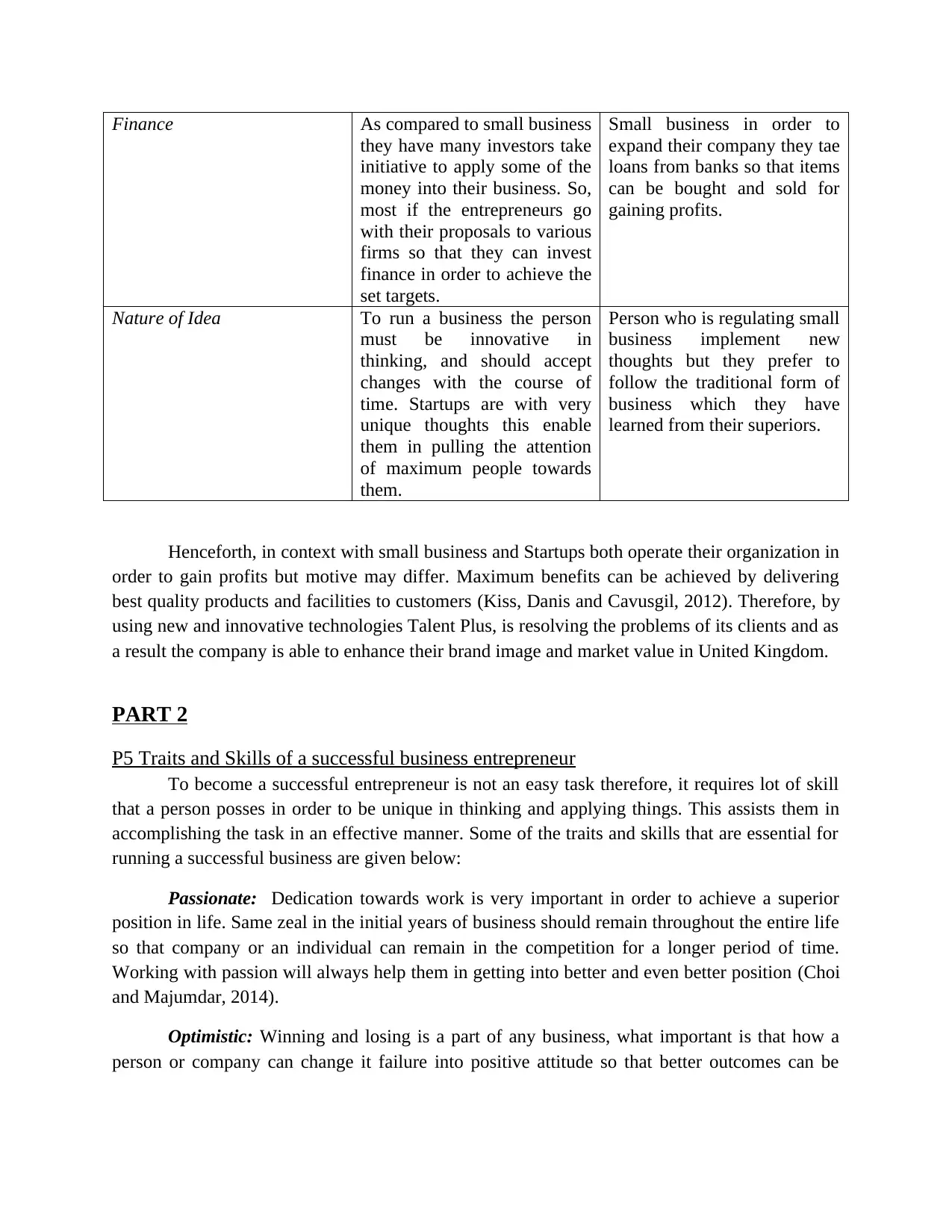
Finance As compared to small business
they have many investors take
initiative to apply some of the
money into their business. So,
most if the entrepreneurs go
with their proposals to various
firms so that they can invest
finance in order to achieve the
set targets.
Small business in order to
expand their company they tae
loans from banks so that items
can be bought and sold for
gaining profits.
Nature of Idea To run a business the person
must be innovative in
thinking, and should accept
changes with the course of
time. Startups are with very
unique thoughts this enable
them in pulling the attention
of maximum people towards
them.
Person who is regulating small
business implement new
thoughts but they prefer to
follow the traditional form of
business which they have
learned from their superiors.
Henceforth, in context with small business and Startups both operate their organization in
order to gain profits but motive may differ. Maximum benefits can be achieved by delivering
best quality products and facilities to customers (Kiss, Danis and Cavusgil, 2012). Therefore, by
using new and innovative technologies Talent Plus, is resolving the problems of its clients and as
a result the company is able to enhance their brand image and market value in United Kingdom.
PART 2
P5 Traits and Skills of a successful business entrepreneur
To become a successful entrepreneur is not an easy task therefore, it requires lot of skill
that a person posses in order to be unique in thinking and applying things. This assists them in
accomplishing the task in an effective manner. Some of the traits and skills that are essential for
running a successful business are given below:
Passionate: Dedication towards work is very important in order to achieve a superior
position in life. Same zeal in the initial years of business should remain throughout the entire life
so that company or an individual can remain in the competition for a longer period of time.
Working with passion will always help them in getting into better and even better position (Choi
and Majumdar, 2014).
Optimistic: Winning and losing is a part of any business, what important is that how a
person or company can change it failure into positive attitude so that better outcomes can be
they have many investors take
initiative to apply some of the
money into their business. So,
most if the entrepreneurs go
with their proposals to various
firms so that they can invest
finance in order to achieve the
set targets.
Small business in order to
expand their company they tae
loans from banks so that items
can be bought and sold for
gaining profits.
Nature of Idea To run a business the person
must be innovative in
thinking, and should accept
changes with the course of
time. Startups are with very
unique thoughts this enable
them in pulling the attention
of maximum people towards
them.
Person who is regulating small
business implement new
thoughts but they prefer to
follow the traditional form of
business which they have
learned from their superiors.
Henceforth, in context with small business and Startups both operate their organization in
order to gain profits but motive may differ. Maximum benefits can be achieved by delivering
best quality products and facilities to customers (Kiss, Danis and Cavusgil, 2012). Therefore, by
using new and innovative technologies Talent Plus, is resolving the problems of its clients and as
a result the company is able to enhance their brand image and market value in United Kingdom.
PART 2
P5 Traits and Skills of a successful business entrepreneur
To become a successful entrepreneur is not an easy task therefore, it requires lot of skill
that a person posses in order to be unique in thinking and applying things. This assists them in
accomplishing the task in an effective manner. Some of the traits and skills that are essential for
running a successful business are given below:
Passionate: Dedication towards work is very important in order to achieve a superior
position in life. Same zeal in the initial years of business should remain throughout the entire life
so that company or an individual can remain in the competition for a longer period of time.
Working with passion will always help them in getting into better and even better position (Choi
and Majumdar, 2014).
Optimistic: Winning and losing is a part of any business, what important is that how a
person or company can change it failure into positive attitude so that better outcomes can be
Paraphrase This Document
Need a fresh take? Get an instant paraphrase of this document with our AI Paraphraser
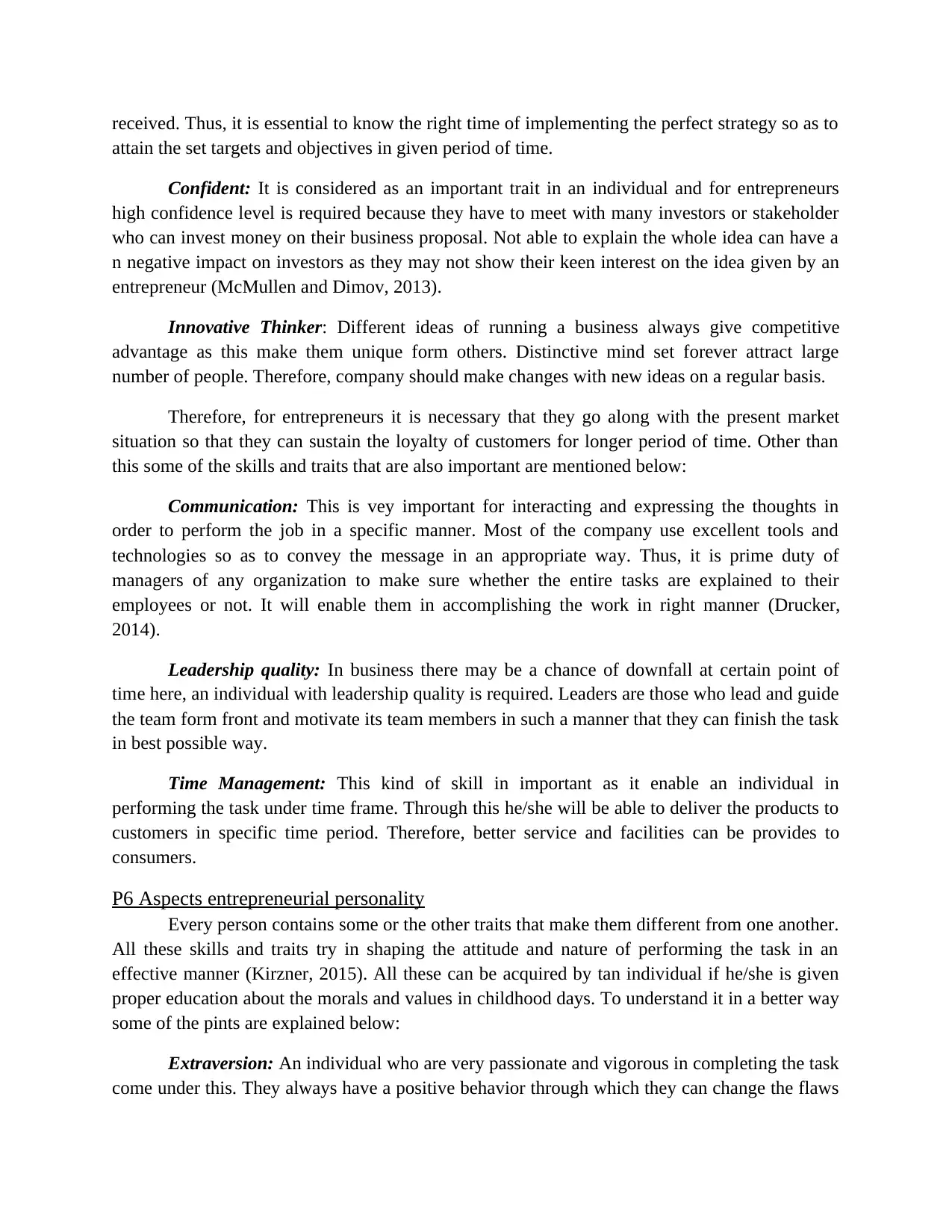
received. Thus, it is essential to know the right time of implementing the perfect strategy so as to
attain the set targets and objectives in given period of time.
Confident: It is considered as an important trait in an individual and for entrepreneurs
high confidence level is required because they have to meet with many investors or stakeholder
who can invest money on their business proposal. Not able to explain the whole idea can have a
n negative impact on investors as they may not show their keen interest on the idea given by an
entrepreneur (McMullen and Dimov, 2013).
Innovative Thinker: Different ideas of running a business always give competitive
advantage as this make them unique form others. Distinctive mind set forever attract large
number of people. Therefore, company should make changes with new ideas on a regular basis.
Therefore, for entrepreneurs it is necessary that they go along with the present market
situation so that they can sustain the loyalty of customers for longer period of time. Other than
this some of the skills and traits that are also important are mentioned below:
Communication: This is vey important for interacting and expressing the thoughts in
order to perform the job in a specific manner. Most of the company use excellent tools and
technologies so as to convey the message in an appropriate way. Thus, it is prime duty of
managers of any organization to make sure whether the entire tasks are explained to their
employees or not. It will enable them in accomplishing the work in right manner (Drucker,
2014).
Leadership quality: In business there may be a chance of downfall at certain point of
time here, an individual with leadership quality is required. Leaders are those who lead and guide
the team form front and motivate its team members in such a manner that they can finish the task
in best possible way.
Time Management: This kind of skill in important as it enable an individual in
performing the task under time frame. Through this he/she will be able to deliver the products to
customers in specific time period. Therefore, better service and facilities can be provides to
consumers.
P6 Aspects entrepreneurial personality
Every person contains some or the other traits that make them different from one another.
All these skills and traits try in shaping the attitude and nature of performing the task in an
effective manner (Kirzner, 2015). All these can be acquired by tan individual if he/she is given
proper education about the morals and values in childhood days. To understand it in a better way
some of the pints are explained below:
Extraversion: An individual who are very passionate and vigorous in completing the task
come under this. They always have a positive behavior through which they can change the flaws
attain the set targets and objectives in given period of time.
Confident: It is considered as an important trait in an individual and for entrepreneurs
high confidence level is required because they have to meet with many investors or stakeholder
who can invest money on their business proposal. Not able to explain the whole idea can have a
n negative impact on investors as they may not show their keen interest on the idea given by an
entrepreneur (McMullen and Dimov, 2013).
Innovative Thinker: Different ideas of running a business always give competitive
advantage as this make them unique form others. Distinctive mind set forever attract large
number of people. Therefore, company should make changes with new ideas on a regular basis.
Therefore, for entrepreneurs it is necessary that they go along with the present market
situation so that they can sustain the loyalty of customers for longer period of time. Other than
this some of the skills and traits that are also important are mentioned below:
Communication: This is vey important for interacting and expressing the thoughts in
order to perform the job in a specific manner. Most of the company use excellent tools and
technologies so as to convey the message in an appropriate way. Thus, it is prime duty of
managers of any organization to make sure whether the entire tasks are explained to their
employees or not. It will enable them in accomplishing the work in right manner (Drucker,
2014).
Leadership quality: In business there may be a chance of downfall at certain point of
time here, an individual with leadership quality is required. Leaders are those who lead and guide
the team form front and motivate its team members in such a manner that they can finish the task
in best possible way.
Time Management: This kind of skill in important as it enable an individual in
performing the task under time frame. Through this he/she will be able to deliver the products to
customers in specific time period. Therefore, better service and facilities can be provides to
consumers.
P6 Aspects entrepreneurial personality
Every person contains some or the other traits that make them different from one another.
All these skills and traits try in shaping the attitude and nature of performing the task in an
effective manner (Kirzner, 2015). All these can be acquired by tan individual if he/she is given
proper education about the morals and values in childhood days. To understand it in a better way
some of the pints are explained below:
Extraversion: An individual who are very passionate and vigorous in completing the task
come under this. They always have a positive behavior through which they can change the flaws
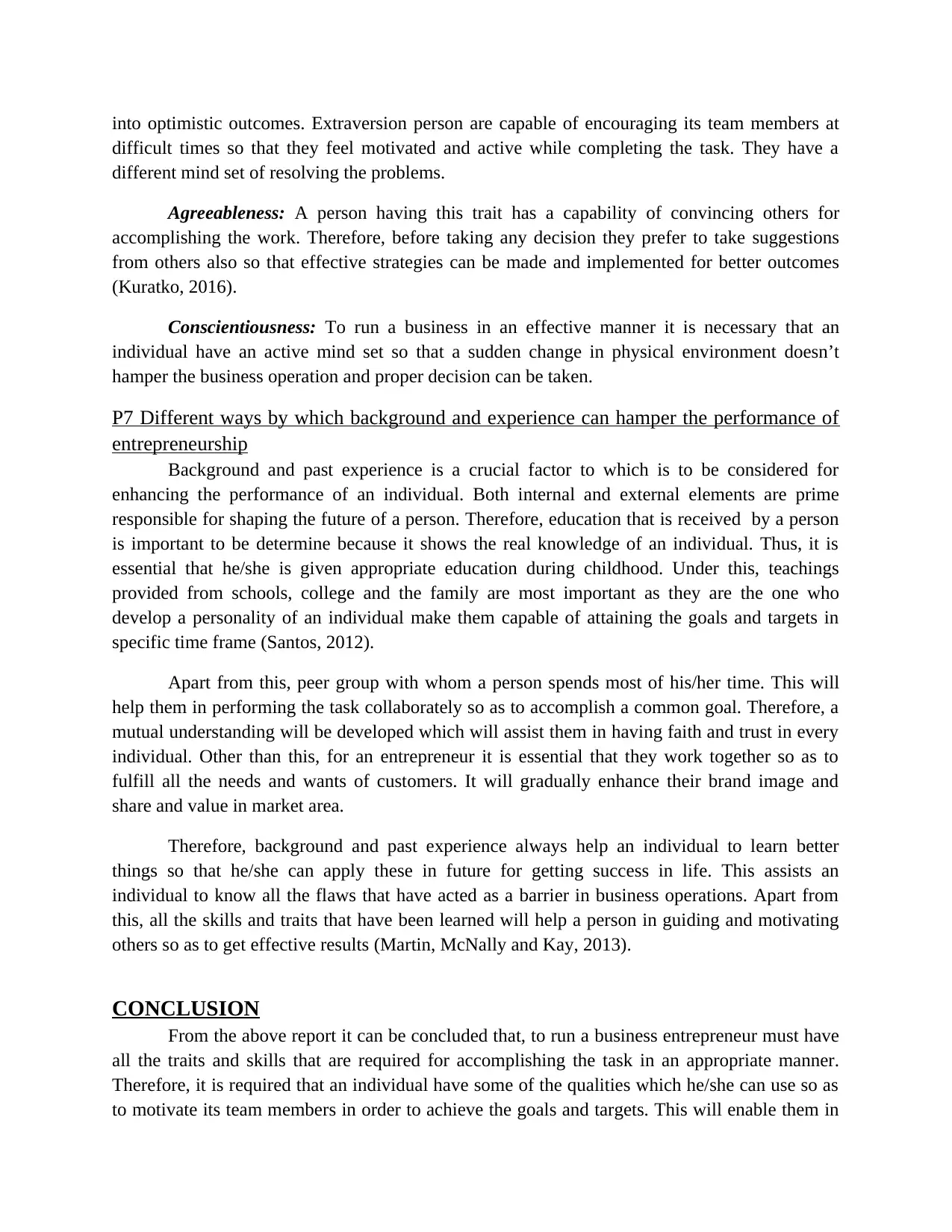
into optimistic outcomes. Extraversion person are capable of encouraging its team members at
difficult times so that they feel motivated and active while completing the task. They have a
different mind set of resolving the problems.
Agreeableness: A person having this trait has a capability of convincing others for
accomplishing the work. Therefore, before taking any decision they prefer to take suggestions
from others also so that effective strategies can be made and implemented for better outcomes
(Kuratko, 2016).
Conscientiousness: To run a business in an effective manner it is necessary that an
individual have an active mind set so that a sudden change in physical environment doesn’t
hamper the business operation and proper decision can be taken.
P7 Different ways by which background and experience can hamper the performance of
entrepreneurship
Background and past experience is a crucial factor to which is to be considered for
enhancing the performance of an individual. Both internal and external elements are prime
responsible for shaping the future of a person. Therefore, education that is received by a person
is important to be determine because it shows the real knowledge of an individual. Thus, it is
essential that he/she is given appropriate education during childhood. Under this, teachings
provided from schools, college and the family are most important as they are the one who
develop a personality of an individual make them capable of attaining the goals and targets in
specific time frame (Santos, 2012).
Apart from this, peer group with whom a person spends most of his/her time. This will
help them in performing the task collaborately so as to accomplish a common goal. Therefore, a
mutual understanding will be developed which will assist them in having faith and trust in every
individual. Other than this, for an entrepreneur it is essential that they work together so as to
fulfill all the needs and wants of customers. It will gradually enhance their brand image and
share and value in market area.
Therefore, background and past experience always help an individual to learn better
things so that he/she can apply these in future for getting success in life. This assists an
individual to know all the flaws that have acted as a barrier in business operations. Apart from
this, all the skills and traits that have been learned will help a person in guiding and motivating
others so as to get effective results (Martin, McNally and Kay, 2013).
CONCLUSION
From the above report it can be concluded that, to run a business entrepreneur must have
all the traits and skills that are required for accomplishing the task in an appropriate manner.
Therefore, it is required that an individual have some of the qualities which he/she can use so as
to motivate its team members in order to achieve the goals and targets. This will enable them in
difficult times so that they feel motivated and active while completing the task. They have a
different mind set of resolving the problems.
Agreeableness: A person having this trait has a capability of convincing others for
accomplishing the work. Therefore, before taking any decision they prefer to take suggestions
from others also so that effective strategies can be made and implemented for better outcomes
(Kuratko, 2016).
Conscientiousness: To run a business in an effective manner it is necessary that an
individual have an active mind set so that a sudden change in physical environment doesn’t
hamper the business operation and proper decision can be taken.
P7 Different ways by which background and experience can hamper the performance of
entrepreneurship
Background and past experience is a crucial factor to which is to be considered for
enhancing the performance of an individual. Both internal and external elements are prime
responsible for shaping the future of a person. Therefore, education that is received by a person
is important to be determine because it shows the real knowledge of an individual. Thus, it is
essential that he/she is given appropriate education during childhood. Under this, teachings
provided from schools, college and the family are most important as they are the one who
develop a personality of an individual make them capable of attaining the goals and targets in
specific time frame (Santos, 2012).
Apart from this, peer group with whom a person spends most of his/her time. This will
help them in performing the task collaborately so as to accomplish a common goal. Therefore, a
mutual understanding will be developed which will assist them in having faith and trust in every
individual. Other than this, for an entrepreneur it is essential that they work together so as to
fulfill all the needs and wants of customers. It will gradually enhance their brand image and
share and value in market area.
Therefore, background and past experience always help an individual to learn better
things so that he/she can apply these in future for getting success in life. This assists an
individual to know all the flaws that have acted as a barrier in business operations. Apart from
this, all the skills and traits that have been learned will help a person in guiding and motivating
others so as to get effective results (Martin, McNally and Kay, 2013).
CONCLUSION
From the above report it can be concluded that, to run a business entrepreneur must have
all the traits and skills that are required for accomplishing the task in an appropriate manner.
Therefore, it is required that an individual have some of the qualities which he/she can use so as
to motivate its team members in order to achieve the goals and targets. This will enable them in
⊘ This is a preview!⊘
Do you want full access?
Subscribe today to unlock all pages.

Trusted by 1+ million students worldwide

gaining superior position in the market area. Apart from this the past experiences and knowledge
what a person acquire plays an important role. This will enable them in knowing the drawbacks
which they can change and gets better results.
what a person acquire plays an important role. This will enable them in knowing the drawbacks
which they can change and gets better results.
Paraphrase This Document
Need a fresh take? Get an instant paraphrase of this document with our AI Paraphraser
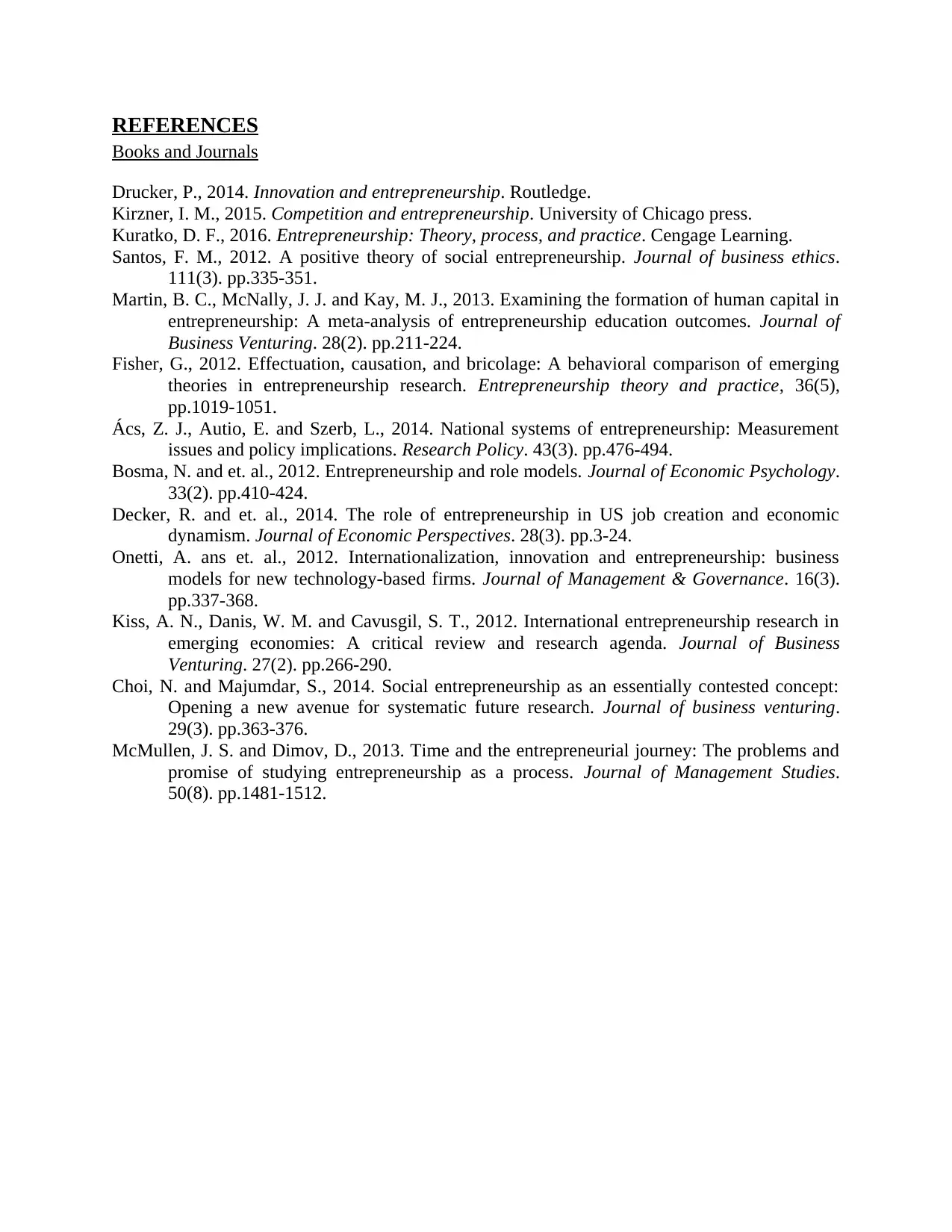
REFERENCES
Books and Journals
Drucker, P., 2014. Innovation and entrepreneurship. Routledge.
Kirzner, I. M., 2015. Competition and entrepreneurship. University of Chicago press.
Kuratko, D. F., 2016. Entrepreneurship: Theory, process, and practice. Cengage Learning.
Santos, F. M., 2012. A positive theory of social entrepreneurship. Journal of business ethics.
111(3). pp.335-351.
Martin, B. C., McNally, J. J. and Kay, M. J., 2013. Examining the formation of human capital in
entrepreneurship: A meta-analysis of entrepreneurship education outcomes. Journal of
Business Venturing. 28(2). pp.211-224.
Fisher, G., 2012. Effectuation, causation, and bricolage: A behavioral comparison of emerging
theories in entrepreneurship research. Entrepreneurship theory and practice, 36(5),
pp.1019-1051.
Ács, Z. J., Autio, E. and Szerb, L., 2014. National systems of entrepreneurship: Measurement
issues and policy implications. Research Policy. 43(3). pp.476-494.
Bosma, N. and et. al., 2012. Entrepreneurship and role models. Journal of Economic Psychology.
33(2). pp.410-424.
Decker, R. and et. al., 2014. The role of entrepreneurship in US job creation and economic
dynamism. Journal of Economic Perspectives. 28(3). pp.3-24.
Onetti, A. ans et. al., 2012. Internationalization, innovation and entrepreneurship: business
models for new technology-based firms. Journal of Management & Governance. 16(3).
pp.337-368.
Kiss, A. N., Danis, W. M. and Cavusgil, S. T., 2012. International entrepreneurship research in
emerging economies: A critical review and research agenda. Journal of Business
Venturing. 27(2). pp.266-290.
Choi, N. and Majumdar, S., 2014. Social entrepreneurship as an essentially contested concept:
Opening a new avenue for systematic future research. Journal of business venturing.
29(3). pp.363-376.
McMullen, J. S. and Dimov, D., 2013. Time and the entrepreneurial journey: The problems and
promise of studying entrepreneurship as a process. Journal of Management Studies.
50(8). pp.1481-1512.
Books and Journals
Drucker, P., 2014. Innovation and entrepreneurship. Routledge.
Kirzner, I. M., 2015. Competition and entrepreneurship. University of Chicago press.
Kuratko, D. F., 2016. Entrepreneurship: Theory, process, and practice. Cengage Learning.
Santos, F. M., 2012. A positive theory of social entrepreneurship. Journal of business ethics.
111(3). pp.335-351.
Martin, B. C., McNally, J. J. and Kay, M. J., 2013. Examining the formation of human capital in
entrepreneurship: A meta-analysis of entrepreneurship education outcomes. Journal of
Business Venturing. 28(2). pp.211-224.
Fisher, G., 2012. Effectuation, causation, and bricolage: A behavioral comparison of emerging
theories in entrepreneurship research. Entrepreneurship theory and practice, 36(5),
pp.1019-1051.
Ács, Z. J., Autio, E. and Szerb, L., 2014. National systems of entrepreneurship: Measurement
issues and policy implications. Research Policy. 43(3). pp.476-494.
Bosma, N. and et. al., 2012. Entrepreneurship and role models. Journal of Economic Psychology.
33(2). pp.410-424.
Decker, R. and et. al., 2014. The role of entrepreneurship in US job creation and economic
dynamism. Journal of Economic Perspectives. 28(3). pp.3-24.
Onetti, A. ans et. al., 2012. Internationalization, innovation and entrepreneurship: business
models for new technology-based firms. Journal of Management & Governance. 16(3).
pp.337-368.
Kiss, A. N., Danis, W. M. and Cavusgil, S. T., 2012. International entrepreneurship research in
emerging economies: A critical review and research agenda. Journal of Business
Venturing. 27(2). pp.266-290.
Choi, N. and Majumdar, S., 2014. Social entrepreneurship as an essentially contested concept:
Opening a new avenue for systematic future research. Journal of business venturing.
29(3). pp.363-376.
McMullen, J. S. and Dimov, D., 2013. Time and the entrepreneurial journey: The problems and
promise of studying entrepreneurship as a process. Journal of Management Studies.
50(8). pp.1481-1512.
1 out of 11
Related Documents
Your All-in-One AI-Powered Toolkit for Academic Success.
+13062052269
info@desklib.com
Available 24*7 on WhatsApp / Email
![[object Object]](/_next/static/media/star-bottom.7253800d.svg)
Unlock your academic potential
Copyright © 2020–2026 A2Z Services. All Rights Reserved. Developed and managed by ZUCOL.




